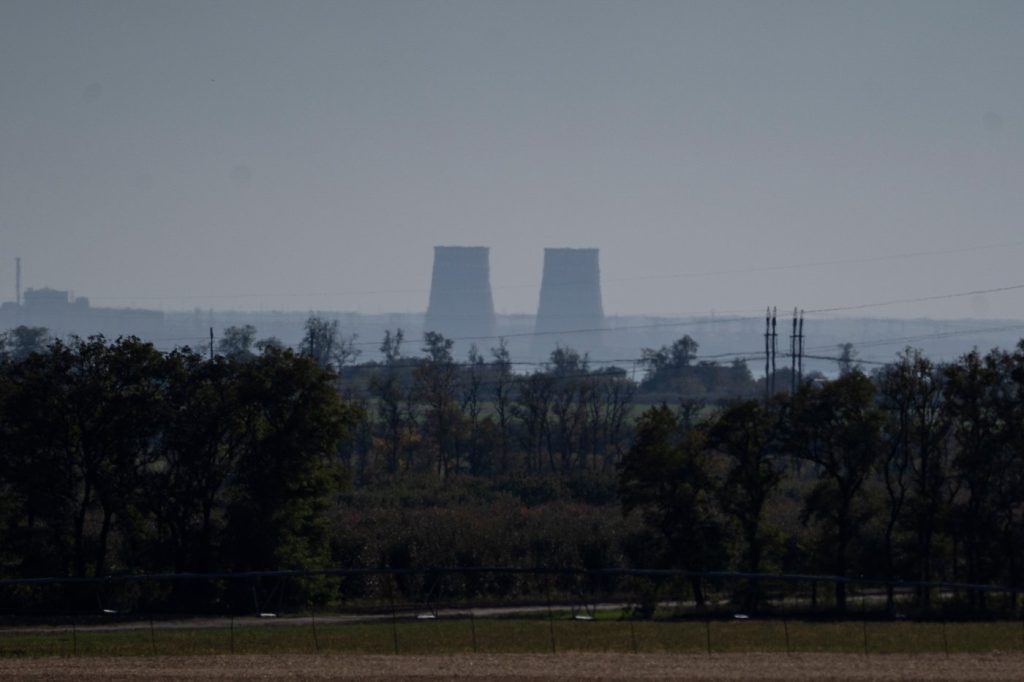KYIV, Ukraine (AP) — Ukrainians expressed their disappointment on Saturday regarding the potential decision by the United States not to supply long-range Tomahawk missiles to Kyiv. The situation surrounding Europe's largest nuclear plant, the Zaporizhzhia power plant, was alleviated somewhat by ongoing repair work to restore its damaged power supply.
Ukrainian President Volodymyr Zelenskyy met with President Donald Trump at the White House on Friday, where the U.S. leader indicated that Washington could potentially provide the missiles that Ukraine believes are crucial for compelling Russian President Vladimir Putin to negotiate.
Despite this diplomatic engagement, Zelenskyy ultimately left the meeting without any tangible commitments, a development that disheartened many citizens in the streets of Kyiv but did not come as a surprise. A Ukrainian military serviceman, Roman Vynnychenko, described the prospect of receiving Tomahawk missiles as a “political game,” asserting that he believed Ukraine would not acquire the missiles. He emphasized the necessity of obtaining new weapons irrespective of American assistance, given the ongoing attacks from Russian drones and missiles that target civilian infrastructure.
“Every day civilians and soldiers die, buildings collapse, our streets and cities are being destroyed,” Vynnychenko lamented, echoing the sentiments of many Ukrainians who have endured the conflict since Russia invaded in February 2022, resulting in a protracted war of attrition along a 1,250-kilometer (780-mile) frontline in eastern and southern Ukraine.
Trump's frustration with the situation has been evident since he resumed office nine months ago. Recently, he has shown increased impatience with Putin and greater openness to supporting Ukraine’s war efforts, including potential arms sales. However, his stance appeared to shift after a lengthy phone call with Putin on Thursday, during which he announced plans for a meeting with the Russian leader in Budapest, Hungary, raising cautious hopes for diplomatic progress to end the conflict. Nevertheless, Ukrainians remain skeptical, given the history of failed negotiations.
In the meantime, Russia persisted with its aerial bombardment of Ukraine, launching three missiles and 164 drones overnight, according to Ukraine's Air Force. Ukrainian forces successfully shot down 136 of the drones. The Russian strikes included an attack on a gas station in the Zarichny district of Sumy, injuring two women aged 51 and 53, as reported by regional Governor Oleh Hryhorov.
Meanwhile, work has commenced on repairing the damaged power supply to the Zaporizhzhia nuclear power plant, as stated by the head of the U.N.'s nuclear watchdog. This repair work aims to resolve a precarious four-week outage that left the plant reliant on backup generators.
Rafael Grossi, the head of the International Atomic Energy Agency (IAEA), noted that both Russian and Ukrainian forces had established special ceasefire zones to allow for safe repairs. He labeled the restoration of off-site power as “crucial for nuclear safety and security.”
The repair operations will unfold in two phases, starting with the Ferosplavna-1 power line, followed by the Dniprovska power line. Notably, this marks the 42nd instance of restoring power lines to the plant since the full-scale invasion began in February 2022.
The Zaporizhzhia nuclear plant, located in an area under Russian control, has been operating on diesel backup generators since September 23, when its last external power line was destroyed amidst mutual allegations of responsibility for the attacks by both Russia and Ukraine. The plant, despite being non-operational, requires reliable power to cool its six shutdown reactors and manage spent fuel, essential to avert any catastrophic nuclear incidents.
Grossi commented that while emergency diesel generators are deemed the “last line of defense” to cool reactors, the frequent need for their activation indicates a worrying trend. He concluded that, “As long as this devastating conflict goes on, nuclear safety and security remains under severe threat.”












